Greer Gilman's Blog, page 87
August 6, 2011
Jove knows I love
Over at
![[info]](https://i.gr-assets.com/images/S/compressed.photo.goodreads.com/hostedimages/1380451598i/2033940.gif) sovay
's, I was handed a meme: here's an actor. What three of his/her films do you love/like/hate? She gave me Nigel Hawthorne, and thought my comments would amuse you here.
sovay
's, I was handed a meme: here's an actor. What three of his/her films do you love/like/hate? She gave me Nigel Hawthorne, and thought my comments would amuse you here.
Wait, he was Fflewddur Fflam's voice? Awesome.
I've only ever seen him in four films, all of which I really really liked to liked.
Pretty much loved:
Trevor Nunn's Twelfth Night, which had the best cross-gendering of the twins I've seen, Richard E. Grant miscast as Sir Andrew Aguecheek (he cannot play a fool believably), Sebastian seen reading Baedeker's Illyria, and Nigel Hawthorne's Malvolio. I do not like productions that are all unsparing Schadenfreude at his downfall. Hawthorne's steward is all prunes and prisms and unyielding rectitude; yet you feel for him. He gets hammered out of shape like a tin toy in a garbage disposal, battered into grinning dents; but he keeps the shards and tatters of his dignity. Throughout the film, he keeps checking his wig reflexively, just quick little dabs--yes, straight--and when he's brought up from his purgatory, naked in his rags and coal-dust, brought before his Lady for rebuke, it's his poor bald head he covers with a modest hand. Any nakedness but that.
He was brilliant in The Madness of King George (Alan Bennett!) and in Ian McKellen's alternative history Richard III. (I so wish that cast would do Jo Walton's Small Change trilogy.)
Liked:
The Winslow Boy: just a beautifully well-made piece of cabinetry, brass-knobbed, solid, unveneered, well-finished in and out, with all the drawers sliding smoothly at a touch.
Hated:
If he was ever in something cheap and expensive. Can't imagine him doing poshlost.
Nine
![[info]](https://i.gr-assets.com/images/S/compressed.photo.goodreads.com/hostedimages/1380451598i/2033940.gif) sovay
's, I was handed a meme: here's an actor. What three of his/her films do you love/like/hate? She gave me Nigel Hawthorne, and thought my comments would amuse you here.
sovay
's, I was handed a meme: here's an actor. What three of his/her films do you love/like/hate? She gave me Nigel Hawthorne, and thought my comments would amuse you here.Wait, he was Fflewddur Fflam's voice? Awesome.
I've only ever seen him in four films, all of which I really really liked to liked.
Pretty much loved:
Trevor Nunn's Twelfth Night, which had the best cross-gendering of the twins I've seen, Richard E. Grant miscast as Sir Andrew Aguecheek (he cannot play a fool believably), Sebastian seen reading Baedeker's Illyria, and Nigel Hawthorne's Malvolio. I do not like productions that are all unsparing Schadenfreude at his downfall. Hawthorne's steward is all prunes and prisms and unyielding rectitude; yet you feel for him. He gets hammered out of shape like a tin toy in a garbage disposal, battered into grinning dents; but he keeps the shards and tatters of his dignity. Throughout the film, he keeps checking his wig reflexively, just quick little dabs--yes, straight--and when he's brought up from his purgatory, naked in his rags and coal-dust, brought before his Lady for rebuke, it's his poor bald head he covers with a modest hand. Any nakedness but that.
He was brilliant in The Madness of King George (Alan Bennett!) and in Ian McKellen's alternative history Richard III. (I so wish that cast would do Jo Walton's Small Change trilogy.)
Liked:
The Winslow Boy: just a beautifully well-made piece of cabinetry, brass-knobbed, solid, unveneered, well-finished in and out, with all the drawers sliding smoothly at a touch.
Hated:
If he was ever in something cheap and expensive. Can't imagine him doing poshlost.
Nine
Published on August 06, 2011 21:16
August 5, 2011
Hobbies Odd

Truly a lovely day out on Wednesday.
Drove with
![[info]](https://i.gr-assets.com/images/S/compressed.photo.goodreads.com/hostedimages/1380451598i/2033940.gif) teenybuffalo
and
teenybuffalo
and
![[info]](https://i.gr-assets.com/images/S/compressed.photo.goodreads.com/hostedimages/1380451598i/2033940.gif) skogkatt
out to Edward Gorey's house, which is haunted in the best sort of way. There are wainscot worlds within worlds there: congeries of pebbles; drifts of every ticket stub from every ballet in New York for fifty years, like a bright unleaving in Terpsichiore's wood; his Mikado paper dolls; ominous bibelots; a cat-clawed sofa; a cat, complacently black-spotted and of monstrous size; skeleton weathervanes; his vanity; delirium in whaleshape; an illustrated elegy for an amputated toe (not his); puppets; passementerie; sketchbooks; the last of his fur coats and white tennis shoes; the Doubtful Guest's scarf; the Victorian hearse finial in which they bore his ashes to the sea.
skogkatt
out to Edward Gorey's house, which is haunted in the best sort of way. There are wainscot worlds within worlds there: congeries of pebbles; drifts of every ticket stub from every ballet in New York for fifty years, like a bright unleaving in Terpsichiore's wood; his Mikado paper dolls; ominous bibelots; a cat-clawed sofa; a cat, complacently black-spotted and of monstrous size; skeleton weathervanes; his vanity; delirium in whaleshape; an illustrated elegy for an amputated toe (not his); puppets; passementerie; sketchbooks; the last of his fur coats and white tennis shoes; the Doubtful Guest's scarf; the Victorian hearse finial in which they bore his ashes to the sea.Unfortunately, only a few of his 25,000 books were on view.
Kind docents had scattered all of Gashlycrumb Tinies about the house, for children to find: Amy on the stairs, head downward; Titus's mystery box; George's legs sticking out from under the rug.
There was a case with his childhood drawings in it, looking rather Crowleyesque. The earliest, Sausage Train, he did at eighteen months.
A lovely man, clearly.
Then we had an excellent, hilarious lunch at the Optimists Cafe, which does overlapping all-day breakfast and all-day afternoon tea (on silver curates).
We went on to Parnassus Books, where I found a fortieth anniversary edition of Lolly Willowes; and, Mr. Fortune's Maggot, with wood engravings by Reynolds Stone: 600 were printed "for friends of the author ... Christmas 1966"). Less exquisite but unusual: George Sylvester Viereck's Salome. He turned up on my desk in my librarian days: a pro-Semitic Nazi who wrote the world's first gay psychic vampire novel (full of deathless ellipses), and was--I'm not inventing this--Tesla's good friend. Sadly, the African grammar should not have been left on the dollar table to raise my hopes. They wanted serious money for it. Pity. It contained such noble practice sentences as: "The elephant is deep in the waterhole and cannot get out" and "Sharpen your machete to serve your boss well." And for you? A slice of the leg?
After that, we went to a salt marsh and looked at shorebirds and the great-grandfather of all horseshoe crabs on the prowl; and at last--O blissful!--to a proper beach. The mermaids swam and I waded (I own nothing I can swim in) and beachcombed to my heart's content. The sand was a half-inch of burnt ochre over silky deep dark umber: most unusual. There were many lunar snails carving paths to the sea.
Nine
Published on August 05, 2011 17:27
August 2, 2011
Well met by moonlight
The witty and excellent
![[info]](https://i.gr-assets.com/images/S/compressed.photo.goodreads.com/hostedimages/1380451598i/2033940.gif) the_termagant
—a scholar of fantasy, a writer, a friend—has joined us. Do please drop by her journal.
the_termagant
—a scholar of fantasy, a writer, a friend—has joined us. Do please drop by her journal.
Nine
![[info]](https://i.gr-assets.com/images/S/compressed.photo.goodreads.com/hostedimages/1380451598i/2033940.gif) the_termagant
—a scholar of fantasy, a writer, a friend—has joined us. Do please drop by her journal.
the_termagant
—a scholar of fantasy, a writer, a friend—has joined us. Do please drop by her journal.Nine
Published on August 02, 2011 21:42
August 1, 2011
"Only long, very green grass, and a may tree, and a witch dancing."
One of the delights of Readercon was Henry Wessells’ talk on twenties fantasy, “Standing in the Shadows of Lud.” I had read only two of his six listed books, both magnificent: Elinor Wylie’s The Venetian Glass Nephew (1925) and Sylvia Townsend Warner’s Lolly Willowes or the Loving Huntsman (1926). The first he spoke of, Stella Benson’s Living Alone (1919), is a dizzy joy. This is how it opens:
MAGIC COMES TO A COMMITTEE
There were six women, seven chairs, and a table in an otherwise unfurnished room in an unfashionable part of London. Three of the women were of the kind that has no life apart from committees. They need not be mentioned in detail. The names of two others were Miss Meta Mostyn Ford and Lady Arabel Higgins. Miss Ford was a good woman, as well as a lady. Her hands were beautiful because they paid a manicurist to keep them so, but she was too righteous to powder her nose. She was the sort of person a man would like his best friend to marry. Lady Arabel was older: she was virtuous to the same extent as Achilles was invulnerable. In the beginning, when her soul was being soaked in virtue, the heel of it was fortunately left dry. She had a husband, but no apparent tragedy in her life. These two women were obviously not native to their surroundings. Their eyelashes brought Bond Street—or at least Kensington—to mind; their shoes were mudless; their gloves had not been bought in the sales. Of the sixth woman the less said the better.
All six women were there because their country was at war, and because they felt it to be their duty to assist it to remain at war for the present....
Five of the members were discussing methods of persuading poor people to save money. The sixth was making spots on the table with a pen.
They were interrupted, not by the expected Mayor, but by a young woman, who came violently in by the street door, rushed into the middle of the room, and got under the table. The members, in surprise, pushed back their chairs and made ladylike noises of protest and inquiry.
"They're after me," panted the person under the table.
She is, of course, a Witch: a spirit of sheer anarchy, and keeper of the House of Living Alone, “a monastery and a convent for monks and nuns dedicated to unknown gods.” It stands in a backwater of London, on Mitten Island, and you need a ferryman to bring you over. The sixth woman, Sarah Brown, finds a room there: not a refuge but a portal.
A garden of quite a good many yards lay behind the house; it contained no potatoes or anything useful, only long, very green grass, and a may tree, and a witch dancing. The extraordinary music to which she was dancing was partly the braying of a neighbouring donkey, and partly her own erratic singing. She danced, as you may imagine, in a very far from grown-up way, rather like a baby that has thought of a new funny way of annoying its Nana; and she sang, too, like a child that inadvertently bursts into loud tuneless song, because it is morning and yet too early to get up ... She was wearing a mackintosh, which was in itself rather funny, but her feet were bare.
The book wanders onward, every which elsewhere, with a plot like a lawnful of fireflies. Its tone is part acidulated syllabub, part hypnagogic reverie, part slapstick. There are ghosts in an air-raid shelter, played for social comedy; fairy Land Girls--slackers all--and their anxious dragon overseer; a Cockney Eros named Elbert; a daft noble warlock soldier (“one felt that magic was not encouraged in the Army”); a blizzard of butterflies drowning in soup at a dinner party; and (of course) Harold the Broomstick, who “is apt to shirk cleaning the stairs, but as it happens, he is keeping company with an O-Cedar Mop in Kentish Town, and I've no doubt she would come over and do the stairs thoroughly every Tuesday night.”
At times it lurches into sententious whimsy; now and then, there is a soul-jarring note of casual prejudice. There are patches of twee. But at its sharpest, the satire still needles: “I gather America is too full of Liberty to leave room for socialism, isn't that so?” You could call it proto-Pratchetty, if it weren’t so very much itself.
And when it flies, it is magicomedy, a Fimbulwinter’s Tale.
For Benson, the Great War has arisen from the absence of Magic, out of the abyss of reason; she hopes for its return: “And as for spells—we have started a new spell. That's the curious part of this War. So gross and so impossible and so unmagic was its cause, that magic, which had been virtually dead, rose again to meet it.” France is unimaginable, a blackness burnt out of time; but at the fringes there is fire leaping, and fantastic shadows.
Here’s midnight over London, and an aerial dogfight:
The guns were shouting now, and the shells wailed and burst not so very far below them, but Harold trembled no longer. More quickly than a falling star he swooped, and in a second the alien witch was in sight, an unwieldy figure whose broomstick sounded rather broken-winded, probably owing to the long-distance flight and to the fourteen stone of Teutonic magic on its back. There was a wicked-looking apparatus attached to the collar of the German broomstick, obviously designed to squirt unpleasant enchantments downward. This contrivance was apparently giving some trouble, for the German was so busy attending to it that at first she did not see or hear the approach of Harold and his rider. She was aroused to her danger by a heavy chunk of magic which struck and nearly unseated her. In a second, however, she was ready with a parrying enchantment, and the fight began. The two broomsticks reared and circled round each other, and over and under each other. From their riders' finger-tips magic of the most explosive kind crackled, and incantations of such potency were exchanged that, I am told, the tiles and chimney-pots of the streets below suffered a good deal. Round and round and over and under whirled the broomsticks, till the very spaces went mad, and London seemed to rush down nightmare slopes into a stormy sky, while its lights swung from pole to pole and were entangled with the stars.
Both broomsticks were by now so uproariously excited that neither witch was able to aim her magic missiles very carefully, and indeed it was not long before Harold passed entirely beyond control. After bucking violently once or twice, he gave a wild high cry that was like the wind howling through the fierce forest past of his race, and fell upon the other broomstick, fixing his bristles into its throat. The shock of the collision was too much for both witches. Our witch—if I may call her so—was shot over Harold's head, and landed on the ample breast of her adversary, who, in consequence, lost her balance. They fell together into space.
Nine
MAGIC COMES TO A COMMITTEE
There were six women, seven chairs, and a table in an otherwise unfurnished room in an unfashionable part of London. Three of the women were of the kind that has no life apart from committees. They need not be mentioned in detail. The names of two others were Miss Meta Mostyn Ford and Lady Arabel Higgins. Miss Ford was a good woman, as well as a lady. Her hands were beautiful because they paid a manicurist to keep them so, but she was too righteous to powder her nose. She was the sort of person a man would like his best friend to marry. Lady Arabel was older: she was virtuous to the same extent as Achilles was invulnerable. In the beginning, when her soul was being soaked in virtue, the heel of it was fortunately left dry. She had a husband, but no apparent tragedy in her life. These two women were obviously not native to their surroundings. Their eyelashes brought Bond Street—or at least Kensington—to mind; their shoes were mudless; their gloves had not been bought in the sales. Of the sixth woman the less said the better.
All six women were there because their country was at war, and because they felt it to be their duty to assist it to remain at war for the present....
Five of the members were discussing methods of persuading poor people to save money. The sixth was making spots on the table with a pen.
They were interrupted, not by the expected Mayor, but by a young woman, who came violently in by the street door, rushed into the middle of the room, and got under the table. The members, in surprise, pushed back their chairs and made ladylike noises of protest and inquiry.
"They're after me," panted the person under the table.
She is, of course, a Witch: a spirit of sheer anarchy, and keeper of the House of Living Alone, “a monastery and a convent for monks and nuns dedicated to unknown gods.” It stands in a backwater of London, on Mitten Island, and you need a ferryman to bring you over. The sixth woman, Sarah Brown, finds a room there: not a refuge but a portal.
A garden of quite a good many yards lay behind the house; it contained no potatoes or anything useful, only long, very green grass, and a may tree, and a witch dancing. The extraordinary music to which she was dancing was partly the braying of a neighbouring donkey, and partly her own erratic singing. She danced, as you may imagine, in a very far from grown-up way, rather like a baby that has thought of a new funny way of annoying its Nana; and she sang, too, like a child that inadvertently bursts into loud tuneless song, because it is morning and yet too early to get up ... She was wearing a mackintosh, which was in itself rather funny, but her feet were bare.
The book wanders onward, every which elsewhere, with a plot like a lawnful of fireflies. Its tone is part acidulated syllabub, part hypnagogic reverie, part slapstick. There are ghosts in an air-raid shelter, played for social comedy; fairy Land Girls--slackers all--and their anxious dragon overseer; a Cockney Eros named Elbert; a daft noble warlock soldier (“one felt that magic was not encouraged in the Army”); a blizzard of butterflies drowning in soup at a dinner party; and (of course) Harold the Broomstick, who “is apt to shirk cleaning the stairs, but as it happens, he is keeping company with an O-Cedar Mop in Kentish Town, and I've no doubt she would come over and do the stairs thoroughly every Tuesday night.”
At times it lurches into sententious whimsy; now and then, there is a soul-jarring note of casual prejudice. There are patches of twee. But at its sharpest, the satire still needles: “I gather America is too full of Liberty to leave room for socialism, isn't that so?” You could call it proto-Pratchetty, if it weren’t so very much itself.
And when it flies, it is magicomedy, a Fimbulwinter’s Tale.
For Benson, the Great War has arisen from the absence of Magic, out of the abyss of reason; she hopes for its return: “And as for spells—we have started a new spell. That's the curious part of this War. So gross and so impossible and so unmagic was its cause, that magic, which had been virtually dead, rose again to meet it.” France is unimaginable, a blackness burnt out of time; but at the fringes there is fire leaping, and fantastic shadows.
Here’s midnight over London, and an aerial dogfight:
The guns were shouting now, and the shells wailed and burst not so very far below them, but Harold trembled no longer. More quickly than a falling star he swooped, and in a second the alien witch was in sight, an unwieldy figure whose broomstick sounded rather broken-winded, probably owing to the long-distance flight and to the fourteen stone of Teutonic magic on its back. There was a wicked-looking apparatus attached to the collar of the German broomstick, obviously designed to squirt unpleasant enchantments downward. This contrivance was apparently giving some trouble, for the German was so busy attending to it that at first she did not see or hear the approach of Harold and his rider. She was aroused to her danger by a heavy chunk of magic which struck and nearly unseated her. In a second, however, she was ready with a parrying enchantment, and the fight began. The two broomsticks reared and circled round each other, and over and under each other. From their riders' finger-tips magic of the most explosive kind crackled, and incantations of such potency were exchanged that, I am told, the tiles and chimney-pots of the streets below suffered a good deal. Round and round and over and under whirled the broomsticks, till the very spaces went mad, and London seemed to rush down nightmare slopes into a stormy sky, while its lights swung from pole to pole and were entangled with the stars.
Both broomsticks were by now so uproariously excited that neither witch was able to aim her magic missiles very carefully, and indeed it was not long before Harold passed entirely beyond control. After bucking violently once or twice, he gave a wild high cry that was like the wind howling through the fierce forest past of his race, and fell upon the other broomstick, fixing his bristles into its throat. The shock of the collision was too much for both witches. Our witch—if I may call her so—was shot over Harold's head, and landed on the ample breast of her adversary, who, in consequence, lost her balance. They fell together into space.
Nine
Published on August 01, 2011 21:48
July 28, 2011
O my!
The week's bit of fortune was finding a lovely new(ish) edition of The Secret Garden illustrated by Inga Moore, who paints some of the finest storybook landscapes since Rackham.
How had I not known?
And she's done a Wind in the Willows, sadly abridged but just beautiful. They aren't quite Ernest Shepard's Rattyand Mole and Toad and Badger--who are beyond iconic--but O my! what a Riverbank.
Nine
How had I not known?
And she's done a Wind in the Willows, sadly abridged but just beautiful. They aren't quite Ernest Shepard's Rattyand Mole and Toad and Badger--who are beyond iconic--but O my! what a Riverbank.
Nine
Published on July 28, 2011 16:12
July 26, 2011
echoes, cobwebs
Anyone there?
ETA: Aha! I've been trying to post for two days now.
Nine
ETA: Aha! I've been trying to post for two days now.
Nine
Published on July 26, 2011 16:58
July 17, 2011
Paradise lost
My heavens, what a gorgeous Readercon!
By my somewhat delirous count, I saw nine panels, five readings (Geoff Ryman's partly in a state of Adamic nudity), another rehearsal reading by![[info]](https://i.gr-assets.com/images/S/compressed.photo.goodreads.com/hostedimages/1380451598i/2033940.gif) greygirlbeast
--all terrific!--three marvellous odd papers, an exhibition of controlled mayhem by the mad
greygirlbeast
--all terrific!--three marvellous odd papers, an exhibition of controlled mayhem by the mad
![[info]](https://i.gr-assets.com/images/S/compressed.photo.goodreads.com/hostedimages/1380451598i/2033940.gif) madrobins
, an improv workshop (in which I portrayed a lady trying to return a pink, three-legged sweater--"and my poor Fido is allergic to mohair").
madrobins
, an improv workshop (in which I portrayed a lady trying to return a pink, three-legged sweater--"and my poor Fido is allergic to mohair").
And for every one of those hours, I was missing some other tantalizing performance, some maddeningly alluring thing. Readercon is cruel in its lavish gifts.
I had one breakfast with![[info]](https://i.gr-assets.com/images/S/compressed.photo.goodreads.com/hostedimages/1380451598i/2033940.gif) crowleycrow
and another with Samuel R. Delany, and tea with my dear friend BBW, who came out to specially to see me and
crowleycrow
and another with Samuel R. Delany, and tea with my dear friend BBW, who came out to specially to see me and
![[info]](https://i.gr-assets.com/images/S/compressed.photo.goodreads.com/hostedimages/1380451598i/2033940.gif) negothick
; I got to hang out with
negothick
; I got to hang out with
![[info]](https://i.gr-assets.com/images/S/compressed.photo.goodreads.com/hostedimages/1380451598i/2033940.gif) sovay
and
sovay
and
![[info]](https://i.gr-assets.com/images/S/compressed.photo.goodreads.com/hostedimages/1380451598i/2033940.gif) rushthatspeaks
and
rushthatspeaks
and
![[info]](https://i.gr-assets.com/images/S/compressed.photo.goodreads.com/hostedimages/1380451598i/2033940.gif) gaudior
and
gaudior
and
![[info]](https://i.gr-assets.com/images/S/compressed.photo.goodreads.com/hostedimages/1380451598i/2033940.gif) rysmiel
and
rysmiel
and
![[info]](https://i.gr-assets.com/images/S/compressed.photo.goodreads.com/hostedimages/1380451598i/2033940.gif) teenybuffalo
, and my Bennington Tea and Fantasy friends --too briefly!--and spoke with tens of other old friends and acquaintances and bright new faces. All too fleetingly. (I barely brushed past
teenybuffalo
, and my Bennington Tea and Fantasy friends --too briefly!--and spoke with tens of other old friends and acquaintances and bright new faces. All too fleetingly. (I barely brushed past
![[info]](https://i.gr-assets.com/images/S/compressed.photo.goodreads.com/hostedimages/1380451598i/2033940.gif) asakiyume
.) I saw the miraculous Ursula, now tall and exuberant.
asakiyume
.) I saw the miraculous Ursula, now tall and exuberant.
I got to the world's best book room, and did not overspend myself.
I had dinner just once, on Thursday (the Lemon Tree, with![[info]](https://i.gr-assets.com/images/S/compressed.photo.goodreads.com/hostedimages/1380451598i/2033940.gif) negothick
and
negothick
and
![[info]](https://i.gr-assets.com/images/S/compressed.photo.goodreads.com/hostedimages/1380451598i/2033940.gif) kestrell
and Canterbury); after that only breakfasts and odd midnight snacks.
kestrell
and Canterbury); after that only breakfasts and odd midnight snacks.
I won the Kirk Polands! (At least the audience did. We slaughtered them. And the words to the Star Trek theme are just bizarrely irrelevant.)
Oh yes, I got to speak on three more lovely panels; gave a reading of new work, whose reception gave me hope; and in the very last hour of the con, drew a roomful of avid listeners (there must have been forty, good heavens) to my paper on "The Languages of Fantasy." They stayed, they questioned, they wanted a book. What a rush!
Then I staggered out in a daze of joy, straight back to the prisonhouse.
Ah well. I have heard the chimes at midnight. Ding!
Nine
By my somewhat delirous count, I saw nine panels, five readings (Geoff Ryman's partly in a state of Adamic nudity), another rehearsal reading by
![[info]](https://i.gr-assets.com/images/S/compressed.photo.goodreads.com/hostedimages/1380451598i/2033940.gif) greygirlbeast
--all terrific!--three marvellous odd papers, an exhibition of controlled mayhem by the mad
greygirlbeast
--all terrific!--three marvellous odd papers, an exhibition of controlled mayhem by the mad
![[info]](https://i.gr-assets.com/images/S/compressed.photo.goodreads.com/hostedimages/1380451598i/2033940.gif) madrobins
, an improv workshop (in which I portrayed a lady trying to return a pink, three-legged sweater--"and my poor Fido is allergic to mohair").
madrobins
, an improv workshop (in which I portrayed a lady trying to return a pink, three-legged sweater--"and my poor Fido is allergic to mohair").And for every one of those hours, I was missing some other tantalizing performance, some maddeningly alluring thing. Readercon is cruel in its lavish gifts.
I had one breakfast with
![[info]](https://i.gr-assets.com/images/S/compressed.photo.goodreads.com/hostedimages/1380451598i/2033940.gif) crowleycrow
and another with Samuel R. Delany, and tea with my dear friend BBW, who came out to specially to see me and
crowleycrow
and another with Samuel R. Delany, and tea with my dear friend BBW, who came out to specially to see me and
![[info]](https://i.gr-assets.com/images/S/compressed.photo.goodreads.com/hostedimages/1380451598i/2033940.gif) negothick
; I got to hang out with
negothick
; I got to hang out with
![[info]](https://i.gr-assets.com/images/S/compressed.photo.goodreads.com/hostedimages/1380451598i/2033940.gif) sovay
and
sovay
and
![[info]](https://i.gr-assets.com/images/S/compressed.photo.goodreads.com/hostedimages/1380451598i/2033940.gif) rushthatspeaks
and
rushthatspeaks
and
![[info]](https://i.gr-assets.com/images/S/compressed.photo.goodreads.com/hostedimages/1380451598i/2033940.gif) gaudior
and
gaudior
and
![[info]](https://i.gr-assets.com/images/S/compressed.photo.goodreads.com/hostedimages/1380451598i/2033940.gif) rysmiel
and
rysmiel
and
![[info]](https://i.gr-assets.com/images/S/compressed.photo.goodreads.com/hostedimages/1380451598i/2033940.gif) teenybuffalo
, and my Bennington Tea and Fantasy friends --too briefly!--and spoke with tens of other old friends and acquaintances and bright new faces. All too fleetingly. (I barely brushed past
teenybuffalo
, and my Bennington Tea and Fantasy friends --too briefly!--and spoke with tens of other old friends and acquaintances and bright new faces. All too fleetingly. (I barely brushed past
![[info]](https://i.gr-assets.com/images/S/compressed.photo.goodreads.com/hostedimages/1380451598i/2033940.gif) asakiyume
.) I saw the miraculous Ursula, now tall and exuberant.
asakiyume
.) I saw the miraculous Ursula, now tall and exuberant.I got to the world's best book room, and did not overspend myself.
I had dinner just once, on Thursday (the Lemon Tree, with
![[info]](https://i.gr-assets.com/images/S/compressed.photo.goodreads.com/hostedimages/1380451598i/2033940.gif) negothick
and
negothick
and
![[info]](https://i.gr-assets.com/images/S/compressed.photo.goodreads.com/hostedimages/1380451598i/2033940.gif) kestrell
and Canterbury); after that only breakfasts and odd midnight snacks.
kestrell
and Canterbury); after that only breakfasts and odd midnight snacks.I won the Kirk Polands! (At least the audience did. We slaughtered them. And the words to the Star Trek theme are just bizarrely irrelevant.)
Oh yes, I got to speak on three more lovely panels; gave a reading of new work, whose reception gave me hope; and in the very last hour of the con, drew a roomful of avid listeners (there must have been forty, good heavens) to my paper on "The Languages of Fantasy." They stayed, they questioned, they wanted a book. What a rush!
Then I staggered out in a daze of joy, straight back to the prisonhouse.
Ah well. I have heard the chimes at midnight. Ding!
Nine
Published on July 17, 2011 17:47
July 13, 2011
Apocalypse now
So the A/C died--choked to death--a day or two before this filthy heatwave. And the box fan, rooted out so I could sleep at all, exploded last night. Apocalyptically. I've never seen a clearer case of malicious suicide. All at once in the dark, it started chewing up its own bladewings in a frenzy of self-loathing, spraying out a hail of shards like machine-gun fire. They rattled round in the maelstrom with a din like God's dice, and they hit like shrapnel.
I've had better awakenings.
For a second or two it was like the bloody Somme in there--the bed was already as soggy as a trench--and then I leapt up and hit the switch.
And there it sits, with its blades like flies' wings in a spiderweb, fantastically gnawed. (Who knew that Shelob likes plastic?) With its long warped shadows, it looks ineffably sad and menacing and dusty. Now I know that Beelzebub has five wings.
Nine
I've had better awakenings.
For a second or two it was like the bloody Somme in there--the bed was already as soggy as a trench--and then I leapt up and hit the switch.
And there it sits, with its blades like flies' wings in a spiderweb, fantastically gnawed. (Who knew that Shelob likes plastic?) With its long warped shadows, it looks ineffably sad and menacing and dusty. Now I know that Beelzebub has five wings.
Nine
Published on July 13, 2011 11:04
July 6, 2011
The dusty closet shelf
From another sketchbook (sadly yellowed), an unfinished cartoon sequence, a sort of early art video. The song ("Jug Band Music") still makes me smile.
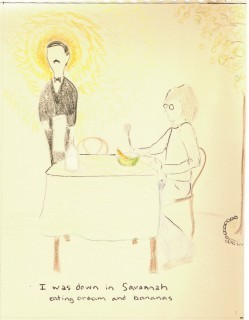
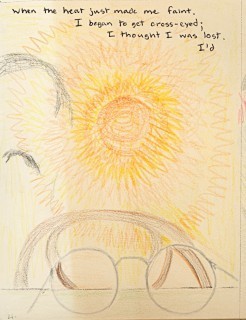
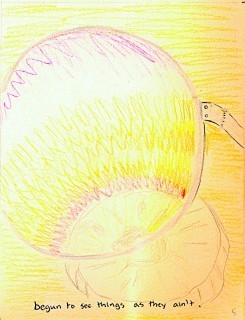
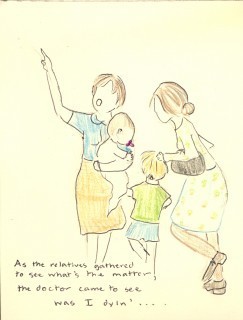
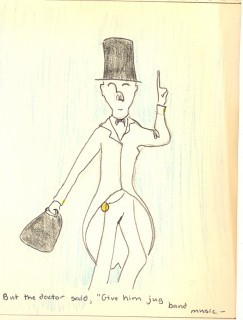
Nine





Nine
Published on July 06, 2011 22:33
July 5, 2011
Dark Arcadias
Literary critic Colin Burrow discusses fantasies in the childrens' stories of his late mother Diana Wynne Jones.
With deep thanks to![[info]](https://i.gr-assets.com/images/S/compressed.photo.goodreads.com/hostedimages/1380451598i/2033940.gif) sovay
.
sovay
.
Nine
With deep thanks to
![[info]](https://i.gr-assets.com/images/S/compressed.photo.goodreads.com/hostedimages/1380451598i/2033940.gif) sovay
.
sovay
.Nine
Published on July 05, 2011 18:00
Greer Gilman's Blog
- Greer Gilman's profile
- 42 followers
Greer Gilman isn't a Goodreads Author
(yet),
but they
do have a blog,
so here are some recent posts imported from
their feed.



